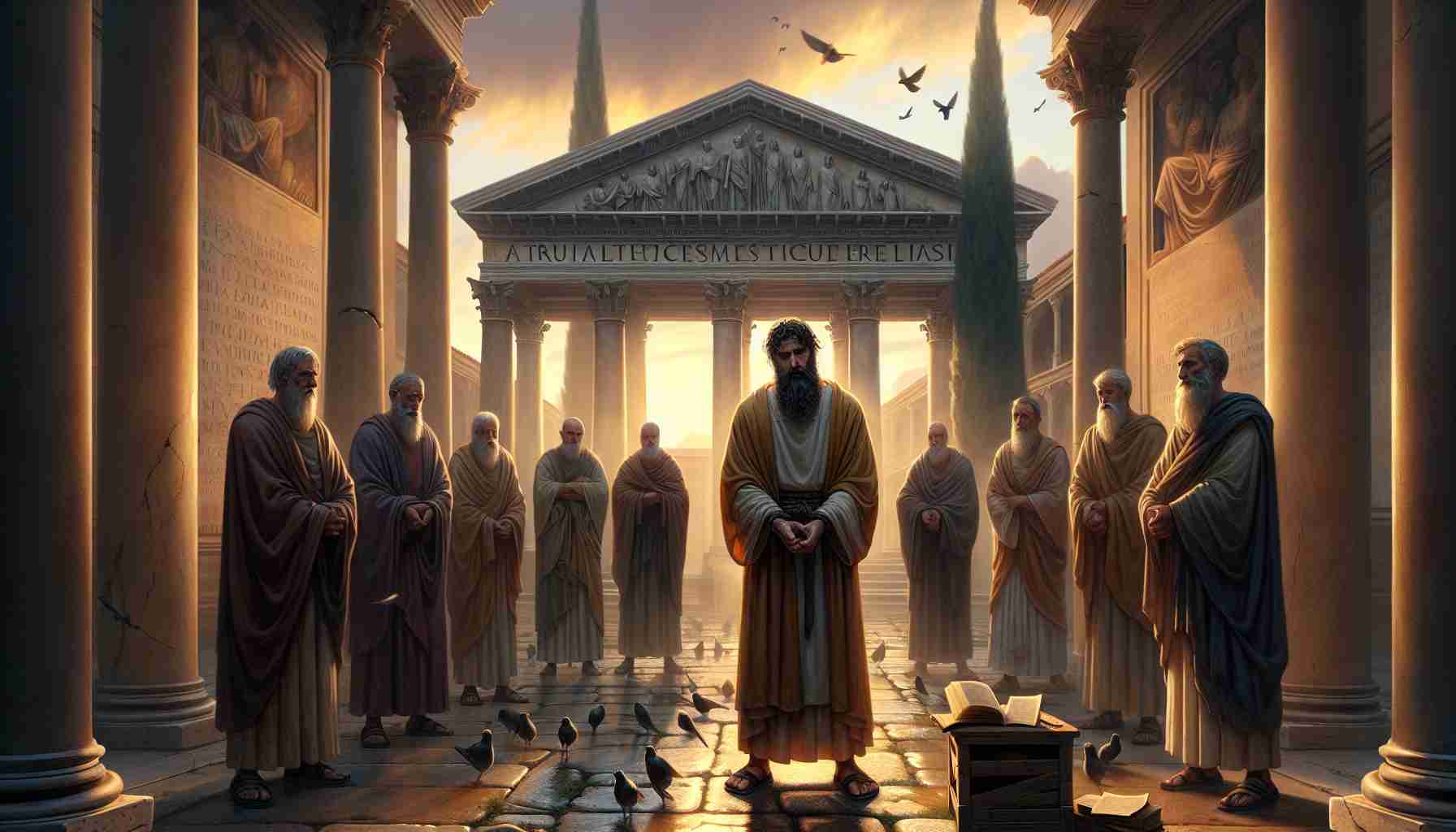

The sun climbed slowly above the red-tiled roofs of second-century Rome, staining the Forum in amber light as marble statues turned to fire. Near the Prefect’s tribunal, centurions cleared the way through the crowds. There, among the early risers—wine sellers, philosophers, priests—stood a man clothed not in rags, nor in senator's purple, but in a threadbare scholars’ cloak, frayed at the elbows, patched along the hem.
Justin—called "the philosopher" by those who read his Apologies and "madman" by those who feared him—stood with hands bound yet spine unbent. His face, bearded and worn by fasting, held no tremor.
“Is it true,” boomed Rusticus, stooped beneath the weight of judicial insignia, “that you refuse to honor the gods of Rome?”
“I do,” said Justin, voice unwavering, “for I worship only the God who made heaven and earth.”
The crowd murmured. Some pitied. Most scoffed. Rusticus sat back, a man more tired than cruel, eyeing the scrolls Justin once sent to Emperor Antoninus.
“You were a philosopher before you were a Christian.”
“I still am,” replied Justin. “But now I seek the Word that orders all reason—Logos incarnate.”
Behind him, six believers stood silent—students of his small school near the Baths of Timothy. Rumors had swirled for days. The Prefect grew weary of Christians—refusing to burn incense, challenging divine Caesar, writing letters with words like “kingdom not of this world.”
“You've written much,” Rusticus said, motioning a scribe forward. “About a crucified Galilean whom you call God. You speak of resurrection, judgment, truth. Do you not fear the sentence?”
Justin’s gaze fixed past the tribunal, past the statues of Jupiter and Mars that bore down with marble eyes. “I long for nothing more than to die for Christ, if I may rise with Him.”
The Prefect’s frown deepened. “Then let blood answer your apology.”
The sentence was swift. Execution by beheading at the Scelerata Gate—where traitors met Roman steel.
As Justin descended from the tribunal, chains scraping stone, a soldier jeered, “Tell your God to reason you out of this one, Athenian!”
He only smiled.
They passed through a colonnade where, years before, he had first met Trypho the Jew. They had debated Messiah and Law for hours under fig trees, the leaves flickering like the parchment Justin once scribbled on. But now only birds nested above, indifferent.
By the roadside, dark cypresses stood guard as they arrived at the place of execution—a patch of earth sprinkled with old blood. The sun now high, heat shimmered across armor and sword.
One of his disciples, Chariton, broke ranks, eyes red with desperate pleading. “Master, must it end in silence?”
Justin turned, warmth in his glance. “Silence? No, child. Truth echoes in eternity.”
The sword rose. The wind fell still.
And Justin, son of Flavia Neapolis, once seeker among Stoics and Platonists, once student at the feet of skeptical sages, met the blade not with fear but with faith. His head fell to the dust—and with it, fear fell from the hearts of many who watched.
In the years that followed, Christians whispered his name in catacombs, chiseled it into walls beneath Rome. His words endured—letters to emperors, and a Dialogue explaining how Christ fulfilled the prophets. Some pagans read them in secret. A few turned.
The church called him "Martyr" not because he died, but because he testified—martys, Greek for witness. He showed that faith need not shun intellect; that one could love Christ with heart and mind; that at the scaffold, as in the classroom, truth remains unshaken.
And Scripture, copied in candlelight by his students, bore ever fresh the call: “Always be ready to give a defense to everyone who asks you a reason for the hope that is in you, with meekness and fear” (1 Peter 3:15).
The gate where he died saw many more down the centuries—persecuted, faithful, defiant. Yet Justin’s defense, penned with ink and sealed with blood, stood like a stone in the river of empire, unyielding.
He had not set fire to temples, nor cursed the emperor, nor taken up arms.
He reasoned.
He believed.
And for this, a philosopher died for Christ.